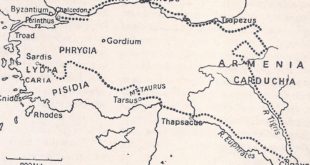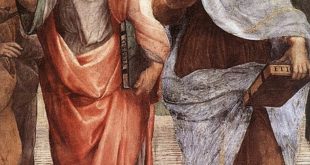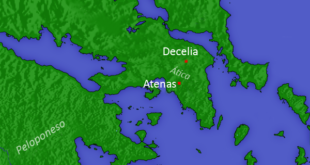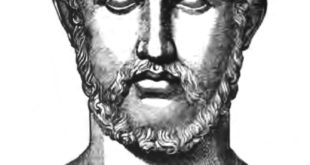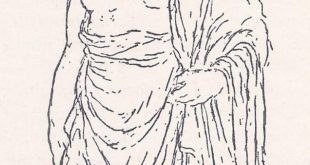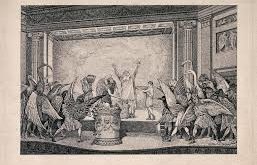The other author who tells us about Socrates is Xenophon. We owe him much. In addition to writing down what he remembered of conversations with Socrates, he wrote a short account of the Peloponnesian War after 411 (Thucydides only completed his history up to that year, although he lived until 400 B.C). His most famous work was the Anabasis (“March up Country”). This describes how (401 B.C.) he joined a Greek force which had been hired by Cyrus, brother of the Persian King, in the hope of seizing the throne. The fact that Cyrus had been the ally of Sparta …
Read More »Socrates’ Death
Socrates’ death occurred in the year 399 an Athenian court condemned Socrates for opposing the official religion of the state, a practice which in fact he studiously avoided and for “corrupting the youth”, which simply meant that he tried to get young people to think things out instead of yapping slogans. When the penalty was being discussed, Socrates said that, far from being punished, he thought he ought to be given free dinners for life in return for his services to the state. This independent line did not incline the court towards leniency and they were not interested when Socrates …
Read More »Oligarchy and Athens in Defeat
Oligarchy — “rule by the few” was a form of government which Athens had not experienced since the 6th century, though it was common in many of the Greek states. This closing stage was surprisingly long. Alcibiades, having made himself unpopular at Sparta, was allowed once more to take command of the Athenian fleet, which he did with some success. On the home front the Spartans were not in a hurry. For a people of such high military reputation they were astonishingly cautious. Year after year they were content to operate from Decelea. They never tried to capture Athens by …
Read More »Decelea, a Thorn in the Flesh
Decelea near the border of Attica and Boeotia was fortified by the Spartans (413). The first piece of good advice which Alcibiades gave the Spartans was to send Gylippus to Syracuse. The second was this: “Restart the war; but don’t just invade Attica for a few weeks of the year. Fortify a position on Attic soil and hold it.” (Gilbert Murray’s translation). Raids from this post made the growing of crops more difficult than ever and cut the route to Euboea, where the cattle and goats had been sent for safety. An attack on Athens itself had constantly to be …
Read More »Hecuba, Queen of Troy
In the year when the expedition sailed to Sicily (415) Euripides put on a play, the Trojan Women, in which the wives of the defeated heroes of Troy were shown in the first bitterness of enslavement. When he wrote, Euripides was burning with the shame of the massacre of Melos; but now to those among the parched and ragged remnant of the Athenian expedition to Sicily who remembered his words they must have seemed like prophecy. As they shuffled towards the slave market or the stone quarries these once proud citizens of Athens might well recall the despairing cry which …
Read More »Sicily
Greeks had first settled round the coasts of Sicily during the colonising period and in 480 they had united to defeat a Carthaginian attempt to oust them from Sicily. Their unity, however, like that of the mainland Greeks against the Persians, did not last long and already in 427 the town of Leontini had asked for help from Athens against the Corinthian colony of Syracuse. Already settled in Sicily, now, in 416, another enemy of Syracuse, Segesta, appealed to Athens. The Athenians sent ambassadors to Segesta. These ambassadors were impressed by the wealth of the place, which the Segestans exaggerated …
Read More »Alcibiades
Alcibiades was the nephew of Pericles. As well as being rich and handsome, he was amusing, clever, insolent and unreliable. He was about twenty when Socrates saved his life at Potidaea in the first year of the Peloponnesian War (432). He fought in other battles and also found time to lead a gay life in Athens, to talk to Socrates and to race chariots in the Olympic Games. It was not till after the death of Cleon that he became a leading politician and general. It may seem surprising that the place of a tanner should have been taken by …
Read More »Socrates
Socrates was short, ugly and brave. He served as a hoplite in the Peloponnesian war and on one occasion saved the life of a rich and handsome young recruit. It was the proper thing to do of course, but one’s admiration is tinged with regret, for the recruit whom Socrates rescued was Alcibiades. The time was now approaching when many Athenians would curse that name. The strange thing is that, throughout these first ten years of the Peloponnesian War and the worse ones which were to follow, one of the wisest and most lovable men who has ever lived was …
Read More »Peace
Not everyone approved of this policy. The country people, whose farms were being devastated every year by the invading Spartans, were ready for peace. So was Aristophanes. In 424 he won first prize with the Knights, a comedy in which he himself played the part of Cleon. So savagely satirical were the lines he had written for this character that no one dared make him a mask to wear. So he smeared his face with red juice and went on the stage without a mask. Cleon for all his power, could not retaliate. In the following year (423) Cleon went …
Read More »Cleon the Tanner
Cruelty showed itself only two years after Pericles was dead. In 428, after the usual spring invasion by the Spartans and before the Olympic games, which were being held as usual, Lesbos had revolted. The Spartans had promised to help the Lesbians and in the following year their fleet at last arrived — a week too late. Mytilene, the capital of the island had already surrendered to the Athenians. The Athenian Assembly now had the people of Mytilene at their mercy. They voted that every man should be put to death, the women and children enslaved. A trireme was sent …
Read More »